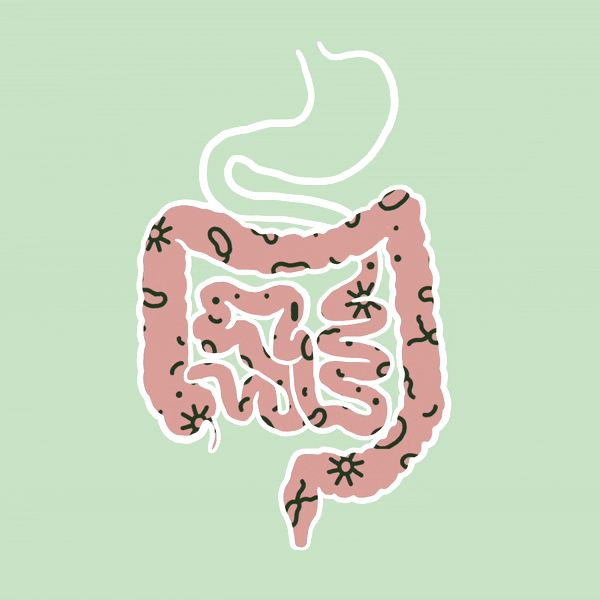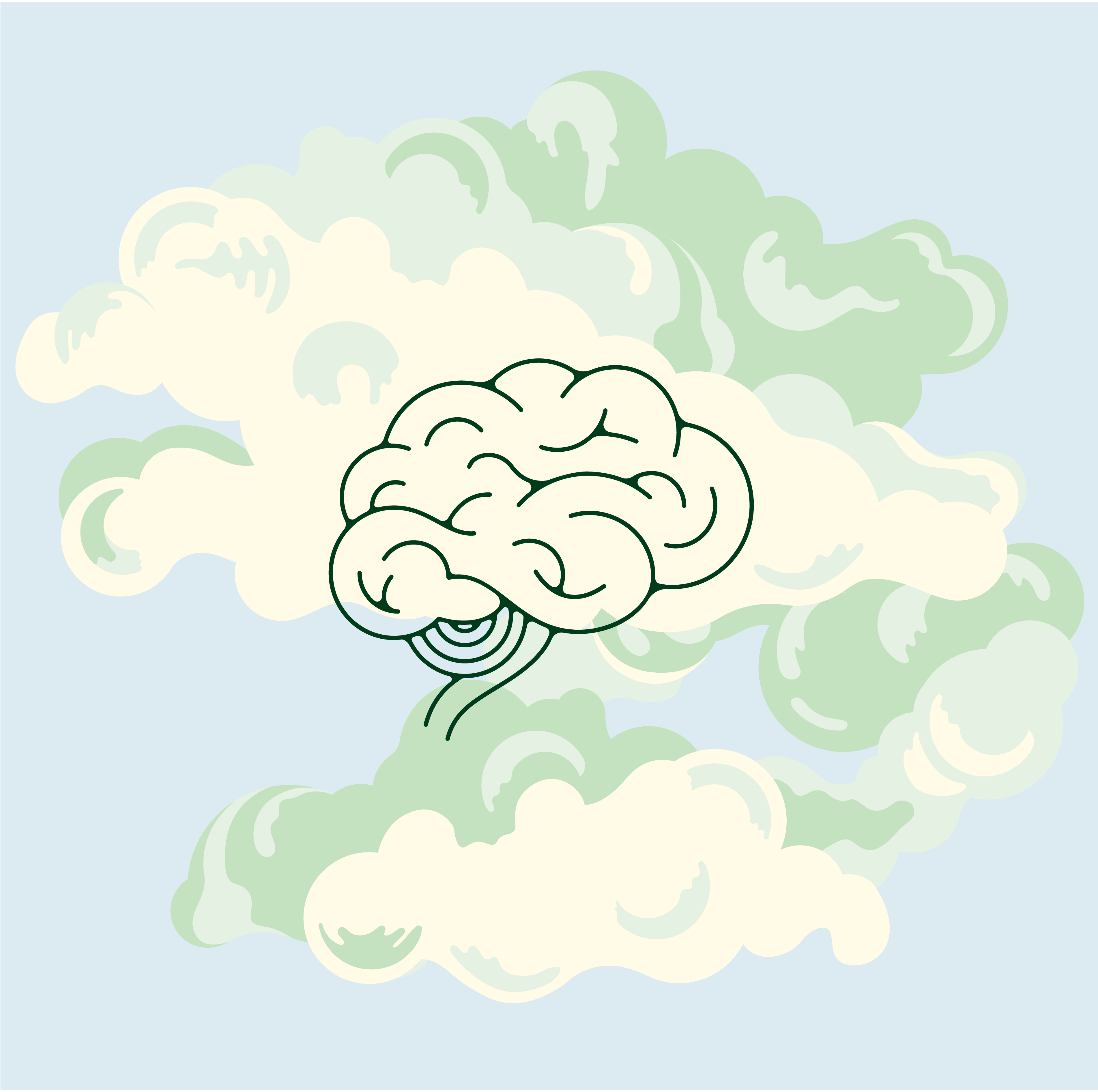Table of contents
1. It’s fair to say that as a global society, we’ve got much better at discussing mental health over the past few years. Campaigns by big multilateral organisations, like the World Health Organisation and the United Nations, have helped to elevate the status of certain mood disorders, as well as common mental illnesses like depression and anxiety, while pushing mental health up the priority list of policymakers. In popular culture, greater visibility has been given to those suffering from mental illness, and more and more businesses are highlighting the importance of mental health in conversations about overall wellbeing.
2. The gut is the second brain
3. What is a gut microbiome?
4. What you can do
Illustrated by Erin Rommel
It’s fair to say that as a global society, we’ve got much better at discussing mental health over the past few years. Campaigns by big multilateral organisations, like the World Health Organisation and the United Nations, have helped to elevate the status of certain mood disorders, as well as common mental illnesses like depression and anxiety, while pushing mental health up the priority list of policymakers. In popular culture, greater visibility has been given to those suffering from mental illness, and more and more businesses are highlighting the importance of mental health in conversations about overall wellbeing.
We hear a lot about self care on the internet, with social media apps like Instagram becoming a place where individuals can source tips to help them to look after themselves. One issue we tend to overlook though, is the impact our gut health has on our mental wellbeing. And yet, it’s a relationship that has been recognised by the medical community for over 100 years, since the work of George Porter Phillips in the early 20th Century. Porter Phillips found that improving the gut health of patients suffering with what was at that time referred to as “melancholia” (clinical depression) via a specific diet rich in gut-friendly bacteria led to improved outcomes in their mental health.
So what exactly is the relationship between our gut health and our mental health? How can improving one help the other? What on earth is a microbiome? And what can we do to ensure our gut is in optimum condition, thereby supporting our mental health?
The gut is the second brain
“You may have heard that the gut is known as the second brain,” Lauren Windas, registered nutritionist and co-founder of ARDERE, tells Daye. “Yes, it’s true!” She continues, “research now shows a pivotal connection between the two organs, known as the gut-brain axis.”
“
The vagus nerve acts like a walkie talkie, sending signals all the way from the brain to the gut and vice versa
According to Lauren, one of the mechanisms that ties the gut to the brain is the vagus nerve, one of the largest cranial nerves that runs from the brainstem all the way through to the large intestine. “The vagus nerve acts like a walkie talkie, sending signals all the way from the brain to the gut and vice versa,” says Lauren, “that’s why it’s not surprising that one system can influence the other.” She continues: “For example, anxiety ahead of a big exam sends a signal via the vagus nerve, causing you to feel butterflies in your tummy, or that urge to use the bathroom more frequently. What’s more, the activity in our gut can impact our mental health, so it’s a two way street!”
Gut bacteria play a key role in influencing your mood and mental health, according to Lauren, “because they can help synthesise up to 90% of the body’s serotonin, a neurotransmitter that plays a key role in regulating our mood. Since reduced levels of serotonin have been linked with anxiety and depression, it’s all that more important that we nurture our gut to help keep our serotonin status healthy.”

Daye's ProViotics can help you strenghten your gut health . In turn, this promotes your overall wellbeing and energy levels.

Any disruptions to your gut microbiota can also create mood problems, according to Lisa McFarlane, co-founder of The Gut Stuff. “If your gut microbiota is disrupted, it can inhibit the cells that make dopamine. Low levels of dopamine are associated with low motivation, difficulty concentrating and mood swings.”

What is a gut microbiome?
It’s important to note that an unhealthy gut is just one contributing factor in overall health that may result in mental illness, and that you should always consult a medical professional if you’re struggling. But for those curious about what they can do to improve their health, it’s first important to understand the role of the gut microbiota in overall health.
According to a 2018 study by Ana M Valdes, a professor in the Faculty of Medicine and Health Sciences at the University of Nottingham, and colleagues, gut microbes (that is the microorganisms that live within that organ) “are key to many aspects of human health including immune, metabolic and neurobehavioural traits.” In any gut, there is a balance of “good” and “bad” microorganisms, or microbes, that make up what is known as your gut microbiome, aka the delicate ecosystem of flora that lives within the organ. In a healthy gut microbiome, there would be plenty of “good” microbes to fight off harmful bacteria.
When it comes to the composition of the gut microbiota (the community of microorganisms in that organ) in different people, the study describes that “although there is a heritable component [...] environmental factors related to diet, drugs, and anthropometric measures [the physical size of different organs] are larger determinants.”
What you can do
Roughly translated, although some aspects of your gut health are genetic, there are things you can do to boost the presence of “good” microbes — and therefore your overall gut health — such as changes to diet or the introduction of probiotic supplements, such as Daye’s ProViotics.
“
Probiotics are widely recognised for their favourable effects on the composition of the gut microbiome.
Probiotics work by introducing more of the “good” microbes into your gut to help it to retain a healthier balance. “A huge literature attests to the importance of the gut microbiome in human health (the number of microbes there approximates the number of cells in the host),” says Douglas Kell, professor of Systems Biology in the Institute of Systems, Molecular and Integrative Biology at the University of Liverpool. “Probiotics are widely recognised for their favourable effects on the composition of the gut microbiome.”
You can also boost the “good” bacteria in your gut through diet. “Try out fermented foods,” says Lauren. “I am a big advocate of getting my clients to consume kimchi, sauerkraut, kefir and miso, as these all pack a wealth of probiotics,” which she describes as “friendly bacteria that can help to colonise our digestive tracts and keep them in balance.”
Given how strong the link is between gut health and mental health, it’s clear that making these small changes could make a big difference to your overall wellbeing. Ultimately, the maintenance of good mental health is a complex issue made up of a diverse set of socioeconomic and physiological factors — there is no quick fix for mental illness, nor can diet alone help those suffering. Nonetheless, given how the strong link is between our gut health and mental health, introducing small changes to support the healthy function of the gut could be a good addition to your self-care routine.






